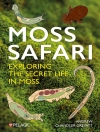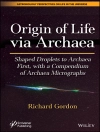Origin of Life via Archaea’s purpose is to add a new hypothesis on what are called ‘shaped droplets’, as the starting point, for flat, polygonal Archaea, supporting the Vesicles First hypothesis. The book contains over 6000 distinct references. it surveys the intellectual battleground of the many ideas of the origin of life on earth, chemical equilibrium, autocatalysis, and biotic polymers.
This book contains 17 chapters, some coauthored. It contains a wide range of topics on the origin of life, including Archaea’s origin, patterns, and species. It shows how various aspects of the origin of life may have occurred at chemical equilibrium, not requiring an energy source, contrary to the general assumption. For the reader’s value, its compendium might also serve many other interesting questions about Archaea.
One chapter presents a theory for the shape of flat, polygonal Archaea in terms of the energetics at the surface, edges and corners of the S-layer. Another shows how membrane peptides may have originated. The book also includes a large table of most extant Archaea, that is searchable in the electronic version. It ends with a chapter on problems needing further.
Об авторе
Richard Gordon, Ph.D., is a theoretical biologist with a B.Sc. in Mathematics from the University of Chicago and a Ph.D. in Chemical Physics from the University of Oregon, retired from the Department of Radiology, University of Manitoba in 2011. Presently he is a volunteer at Gulf Specimen Marine Lab & Aquarium, Panacea, Florida. Interest in exobiology (now astrobiology) dates from 1960s undergraduate work on organic matter in the Orgueil meteorite with Edward Anders. He has published critical reviews of panspermia and the history of “discoveries” of life in meteorites.












